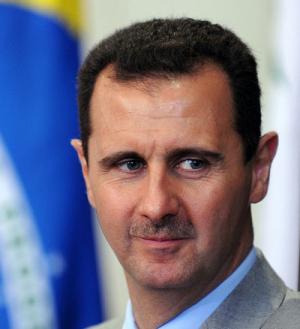Quick takes Assad’s future; Israel’s missile defense; U.S. overseas bases
Israel’s chief-of staff said that the likelihood of the Assad-Hezbollah-Iran axis winning the war in Syria is “zero” (his words). The Alawite community is too small to continue and provide soldiers to Syria’s army; both Iran and Hezbollah appear to have concluded that the cost of maintaining Assad in power is just too high; and Russia has decided against sending ground troops. Israel has successfully tested the Arrow-3, its anti-ballistic system designed to intercept long-range missiles. The Pentagon proposes creating an architecture of hub-and-spokes military bases overseas to fight terrorists.

Bashar Assad // Source: commons.wikimedia.org
Syria: IDF chief says Assad is doomed
Gen. Gadi Eisenkot, the IDF chief of staff, the other day said the key to ending the war in Syria is in the hands of the United States and Russia – but that even if the two powers cooperated, it would take a couple of years or more to stabilize Syria and the end the violence there.
Eisenkot, who was promoted to the position of chief of staff earlier this year, is highly regarded as a “thinking general,” capable of both leading soldiers in battle and also engaging in the scholarly fashioning of long-term strategy. He was – and is – opposed to an Israeli military strike on Iran’s nuclear facilities, and is known to be keenly aware of the limits of military power.
He is also known to support the view that Israel’s interests, at least in the short term, would be served if Assad remained in power. Assad’s influence on events in Syria has been steadily diminishing, and the shots are now being called by Iran and Hezbollah, the Assad regime’s two steadfast supporters.
Eisnekot believes that as hostile to Israel as Iran and Hezbollah are, they are at least rational in their approach to the use of power, and understand the give-and-take of regional power relations. This cannot be said of ISIS. Since the moderate opposition to Assad is currently too fragmented, then until there is a unified and cohesive non-Islamist force to challenge both Assad and ISIS, Israel would be better off with the status quo.
The status quo, however, cannot be maintained because the Alawite community is too small to continue and provide soldiers to Syria’s army, and both Iran and Hezbollah appear to have concluded that the cost of maintaining Assad in power is just too high.
Eisenkot said that the likelihood of the Assad-Hezbollah-Iran axis winning the war in Syria is “zero” (his words).
Even in order to keep himself in power only in western Syria – Assad now controls only about 15-20 percent of Syria’s territory — Assad would need a large number of ground forces, forces which the Alawite community cannot provide, and which Russia, Hezbollah, and Iran are unwilling to supply.
